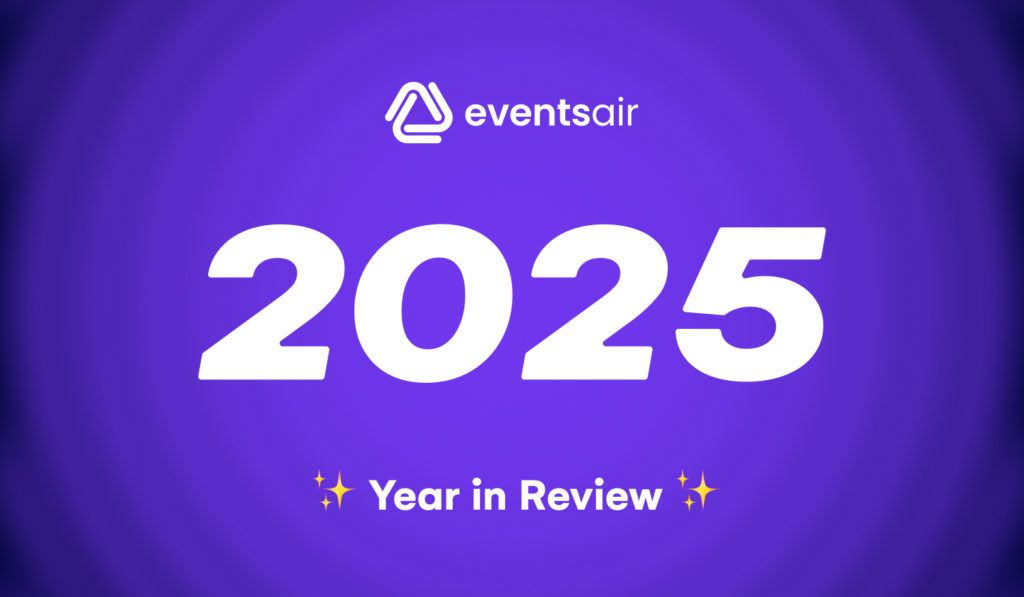
Abstract management can make up one of the many tasks on an event planner’s ever-growing to-do list. And while it’s not the most glamorous aspect of event planning, it’s absolutely critical to your event’s success, quality, and credibility.
You need a great plan and a reliable abstract management system to get it right.
In this EventsAir guide, we’re giving you a clear idea of how we help event planners efficiently manage abstract submissions and streamline the process. From submission to scheduling, here’s how we event planners master abstract management.
What is abstract management?
Abstract management is the process of collecting, organizing, and reviewing abstracts for academic or scientific events.
The process involves quite a few distinct stages, including:
- Collection: Receiving abstracts and organizing them for review.
- Review: Evaluating the quality and relevance of submissions.
- Selection: Choosing which abstracts to include in the event.
- Scheduling: Creating a program schedule for the event.
- Publishing: Notifying authors of their acceptance or rejection.
Within each of these stages, event planners need to navigate a multitude of sub-tasks and challenges, adding to the complexity. Luckily, event management platforms like EventsAir can simplify and streamline this process.
Why is optimizing abstract management important?
Enhances event quality
Abstract mismanagement can lead to all kinds of issues, including:
- Rushed review sprints
- Lost submissions
- Scheduling conflicts
- Poor quality content in the event program
All of these directly impact the quality of your event and indirectly impact attendee experience, future event attendance, reputation, and sponsorships. A defined, reliable abstract management process can help you avoid these pitfalls and ensure a successful event.
Saves time and effort
An optimized process also reduces the amount of time you and your team need to spend on admin tasks. Errors, confusion, and miscommunication eat into the finite hours you have available to plan a successful event.
A simple example: Switching from email threads and spreadsheets to a centralized abstract management system can save countless hours on data entry, submission sorting, and communication with authors.
Improves presenter experience
Finally, a smooth abstract management process makes life easier for presenters. They can easily submit their abstracts, track the status of their submissions, and receive timely updates—all through a user-friendly portal.
This enhances their experience and makes them more likely to participate in future events.
How to optimize your abstract management
Step 1: Create a self-service submission portal
The first step in optimizing your event’s abstract management process is removing yourself from the submission process.
A self-service portal allows you to collect all the information you need from prospective presenters without manual effort. EventsAir makes it easy to create dedicated portals where presenters can submit their abstracts for review.
You have access to a deep settings menu, with granular control over critical details like:
- Mandatory sections
- Available themes
- Available presentation types
- Word counts
- Closing dates
- AV requirements
…and much more.
Whatever settings you enable will be communicated and enforced automatically whenever a presenter submits an abstract. This means less time spent manually screening abstracts to ensure they meet your minimum requirements.
Step 2: Define statuses
Statuses are vital elements in an organized, effective abstract management process. They give you, presenters, and your management tool a quick and clear overview of each abstract’s current stage in the review process—and what needs to happen next.
EventsAir’s default abstract statuses are:
- To be reviewed
- Under review
- Re-submitted
- Rejected
- Final paper received
- Edits requested
- Draft
- Accepted
Depending on how you’d like to structure your abstract review and approval process, you can toggle these on and off in settings. However, in our experience, having more statuses makes high-level management much easier for large-scale conferences and events.
Step 3: Create a Reviewer Portal
Creating reviewer portals is another powerful way to optimize your abstract management process.
With EventsAir, you can give reviewers a streamlined alternative to email threads and shared documents. A Reviewer Portal allows them to access, review, and score abstracts in one central location.
All the reviewers you appoint for an event can create accounts. Then, they can log into your dedicated Reviewer Portal for an up-to-date overview of pending abstracts, past reviews and scores, and responses to any edits they previously requested.
Here are a few additional features that make life easier for you and your reviewers:
Review criteria
EventsAir lets you define clear reviewing criteria that all reviewers will be required to use when scoring abstracts.
Here are a few review criteria you can use:
- Relevance: Determine how well the abstract aligns with the event’s themes and topics. This ensures that the content is pertinent to the conference’s audience.
- Originality: Assess the novelty of the ideas or research presented. This helps to identify new contributions to the field.
- Correctness: Assess how accurate and reliable the information presented is. This helps to ensure the quality of the content being presented.
You can also assign weights to different criteria (e.g., Relevance = 40%, Originality = 30%, Correctness = 30%) to reflect their importance in the overall scoring process.
Review panels
Review panels are groups of reviewers that you can define in EventsAir.
This makes it much easier to automate your review process—you can set up rules that automatically funnel abstracts to the appropriate reviewer based on theme. That way, each reviewer can focus on a specific topic and provide more in-depth evaluations.
Step 4: Automate communication
Communication is essential during a standard abstract management process. Presenters submit abstracts, organizers notify reviewers, reviewers request edits, and finally, organizers notify presenters and organizers of their decisions.
Automating these standard communications can minimize errors and miscommunication and save time and effort.
EventsAir’s powerful workflow-building tools make this possible. Using no-code settings menus, you can set up advanced automation based on all kinds of triggers—from abstract status to presenter actions.
For example, you can automate notifications for:
- Abstract submissions
- Reviewer comments
- Reviewer decisions
- Abstract status changes
- Abstract edits
Plus, both presenters and reviewers can always refer to their respective portals as a source of truth for all communications and updates related to the submission process.
Step 5: Integrate with your agenda
Finally, once abstracts are accepted, they must be integrated into your event agenda. EventsAir makes it easy to transition from abstract management to scheduling by allowing you to assign accepted abstracts to specific time slots and rooms.
Looking to streamline your abstract management?
Optimizing your abstract management process is not just about making your life easier—it’s about enhancing the quality of your event and creating a better experience for your presenters and attendees.
With EventsAir, you can automate and streamline every aspect of abstract management, from submission to review to scheduling. Ready to improve your abstract management?
Request a demo or find a plan that suits your needs.
Abstract Management | Event Planning & Management | Event Technology & Apps
See EventsAir in action
Discover why 12,000+ event professionals trust EventsAir to deliver effortless events, every time.




